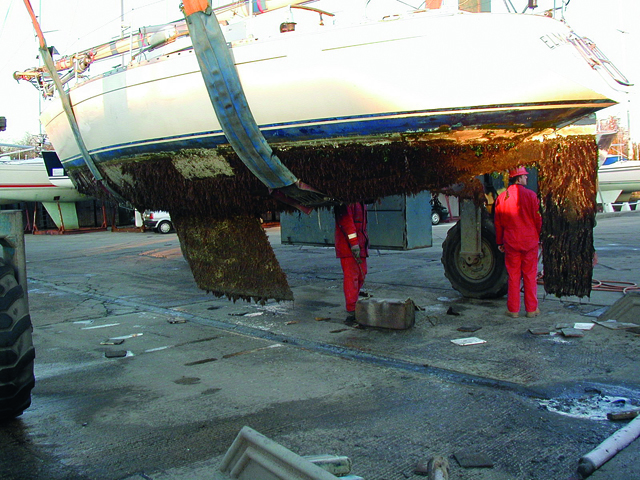The world's oldest single-handed transatlantic sailing race is heading to New York's newest marina.
The Transat, the oldest, single-handed transatlantic sailing race in history, is heading to New York City and will culminate at the new ONE°15 Brooklyn Marina, race organisers announced today.
Located in the heart of Brooklyn Bridge Park, ONE°15 Brooklyn Marina, the newest marina to be built in New York City in decades, is currently under construction with a grand opening in spring 2016 to be marked by this iconic race.
The Transat will chart a course from Plymouth on the south coast of Devon, England to New York City, a route across the North Atlantic that will test the best single-handed sailors in the world to their limits.
Returning for the first time in eight years, The Transat 2016 is expected to attract 30 boat entries from four different classes.
The Transat’s event director Hervé Favre said: ‘We are extremely happy to announce ONE°15 Brooklyn Marina as our host venue partner for The Transat’s exciting finish.
‘The marina will have many promising features but a key one for us as organizers is the fact that all of the fleet will have the ability to stay together in one marina, which I believe is unprecedented for a multihull race in New York.
‘This is a game changer for New York Harbor, and I believe The Transat will be the first of many races to come to this state-of-the art new marina.’
The Transat is scheduled to depart from Plymouth on 2 May 2016 with ONE°15 Brooklyn Marina expecting the first boat around the 9 May, though due to the nature of the race, there is no predicting what time the boats will arrive.
The Transat has not visited New York since its first year in 1960.
To register for entry into the race, visit: https://octp.formstack.com/forms/thetransat2016_entryform
Race history
The OSTAR (Observer Singlehanded Trans-Atlantic Race) was created in 1960 by a handful of pioneering sailors. The race was organized every four years by the Royal Western Yacht Club (RWYC) from 1960 through to the 2000 event, albeit with a lot of involvement from the French event organizer Pen Duick in the 90s, in order to cater for the demands of the professional campaigns that dominated the event.
After the 2000 edition, OC Sport stepped in to develop the event and acquired the rights to the professional part. OC Sport organized The Transat in 2004 and 2008, the 2012 edition was deferred at the request of IMOCA (the largest competing class).
The RWYC continues to organize a solo transatlantic race for Corinthian and non-professional sailors that is still known as the (O)STAR,. This race usually falls a year after the professional big boat race i.e. 2005, 2009, 2013, 2017. Both the amateur Yacht Club event and The Transat have the right to link to the history of the original race created in 1960, and to the rich history it has produced.
The first race was competed by just a handful of pioneering sailors including Francis Chichester and Blondie Hasler who coined the phrase: “One man, one boat, the ocean.” There has been tragedy, dramatic rescues and exceptional drama since the race began in 1960. Over time The Transat, as it is known today, has evolved and now serves the professional end of offshore sailing. But there are few modern day races that can reflect on such a long and outstanding history.
Monohull IMOCA 60 record: 12 days, 11 hours and 45 minutes set by Loick Peyron (FRA) on board Gitana in 2008. Multihull 60ft record: 8 days, 8 hours, 29 minutes set by Michel Desjoyeaux (FRA) on board Géant in 2004.
Clipper round the world yacht race under way
The 12 international crews competing in the 10th edition of the world’s longest ocean race set sail on the 40,000…
New solo non-stop, around the world yacht race announced
A new Golden Globe Race will set sail in June 2018 to mark the 50th anniversary of Sir Robin Knox-Johnston's…
Yachtsman dies in Clipper Round the World Race
Andrew Ashman, from Orpington, Kent did not regain consciousness after being injured while reefing the mainsail, approximately 120 nautical miles…
£20,000 needed to bring all-girl crew’s Whitbread Race yacht home
The Maiden Rescue crowd funding project needs to hit its £44,000 target by 3 July
Wreck to Transat racer
Is racing across the Atlantic in a boat bought with a student loan really feasible? Here's the story of PBO…
Solar-powered transatlantic boat arrives in New York
7,000-mile voyage on clean energy
Wanted: transatlantic skipper for Jester challenge
Are you interested in taking part in a single-handed transatlantic race starting this Saturday? If so... read on
Tributes paid to yachtsman who died after falling overboard
The sailor, who has been named as transatlantic sailor Philip Walwyn, was in the midst of his 17th cross Atlantic…











